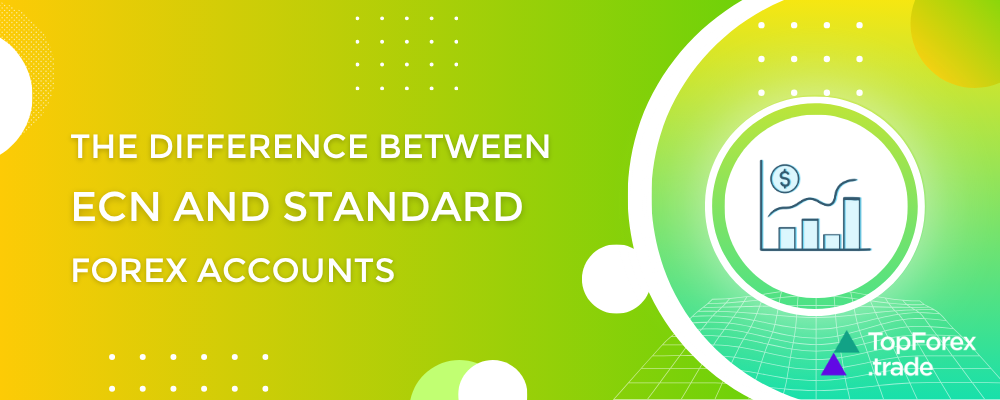ECN and Standard accounts: which one fits your trading style?

When starting your trading journey, one of the most important decisions you’ll make is choosing the right type of trading account. Two of the most common account types offered by Forex and CFD brokers are ECN (Electronic Communication Network) accounts and Standard accounts. Each has its own advantages and disadvantages, depending on your trading style, experience level, and strategy.
In this article, we’ll break down the key differences between ECN and Standard accounts, provide real-world examples, and help you decide which one suits you best.
What is a Standard account in the FX market?

A Standard account (also known as a Market Maker account) is the most common type of trading account, especially for beginners. In this setup, the broker acts as the counterparty to your trades, meaning they provide liquidity directly.
Key features of a Standard account:
✅ Fixed spreads (though some brokers offer variable spreads)
✅ No or low commission fees
✅ Suitable for beginners and casual traders
✅ Often includes additional services like free educational resources and customer support
Example of a Standard account trade:
Imagine you buy 1 lot (100,000 units) of EUR/USD with a fixed spread of 1.5 pips.
- Spread cost: 1.5 pips × $10 (per pip for 1 lot) = $15
- Commission: $0 (since Standard accounts usually don’t charge commissions)
- Total cost: $15
This makes Standard accounts simple and predictable, but they may have slightly higher trading costs compared to ECN accounts in certain market conditions.
What is an ECN account in the FX market?

An ECN account connects traders directly to a network of liquidity providers (banks, hedge funds, and other traders). Instead of trading against the broker, you get access to raw spreads with low markups but pay a commission per trade.
Key features of an ECN account:
✅ Tight, variable spreads (often starting from 0 pips)
✅ Commission-based pricing (charged per lot traded)
✅ Faster execution with minimal requotes
✅ Best for scalpers, high-volume traders, and professionals
Example of an ECN account trade:
You buy 1 lot of EUR/USD with a spread of 0.2 pips and a commission of $3.5 per side (per lot).
- Spread cost: 0.2 pips × $10 = $2
- Commission: $3.5 × 2 (entry & exit) = $7
- Total cost: $9
While the spread is much lower, the commission adds up. However, for high-frequency traders, ECN accounts can still be cheaper overall.
ECN vs. Standard account: which is better?

| Feature | Standard account | ECN account |
|---|---|---|
| Spreads | Fixed or variable (wider) | Variable (tighter, often 0 pips) |
| Commissions | Usually none | Charged per lot |
| Execution speed | Slightly slower | Faster, no dealing desk |
| Best for | Beginners, swing traders | Scalpers, day traders, pros |
| Minimum deposit | Often lower ($50-$500) | Usually higher ($500-$5,000) |
When to choose a Standard account?
✔ You’re a beginner
✔ You prefer predictable costs
✔ You trade less frequently
When to choose an ECN account?
✔ You’re an experienced trader
✔ You scalp or trade with high frequency
✔ You need the tightest spreads possible
Top 5 FX and CFD brokers to start trading
If you’re ready to start trading, here are five of the best brokers offering both ECN and Standard accounts:
BlackBull Markets
🔹 Regulation: FMA (NZ), FSA (Seychelles)
🔹 Account types: ECN Prime, Standard
🔹 Spreads: From 0.0 pips (ECN)
🔹 Commission: $6 per lot (round turn)
🔹 Minimum deposit: $200
Why choose BlackBull?
- True ECN execution
- Great for algorithmic trading (supports MetaTrader 4 & 5)
XTB
🔹 Regulation: FCA, CySEC, KNF
🔹 Account types: Standard (Pro accounts available)
🔹 Spreads: From 0.1 pips
🔹 Commission: Free on Standard accounts
🔹 Minimum deposit: $0
Why choose XTB?
- No minimum deposit
- Advanced xStation 5 platform
eToro
🔹 Regulation: FCA, CySEC, ASIC
🔹 Account types: Standard (CFD & Copy Trading)
🔹 Spreads: Variable, slightly higher
🔹 Commission: Spread-only, no direct commissions
🔹 Minimum deposit: $50
Why choose eToro?
- Best for social trading
- User-friendly for beginners
Risk disclaimer: eToro is a multi-asset platform which offers both investing in stocks and cryptoassets, as well as trading CFDs.
CFDs are complex instruments and come with a high risk of losing money rapidly due to leverage. 61% of retail investor accounts lose money when trading CFDs with this provider. You should consider whether you understand how CFDs work, and whether you can afford to take the high risk of losing your money.
This communication is intended for information and educational purposes only and should not be considered investment advice or investment recommendation. Past performance is not an indication of future results.
Copy Trading does not amount to investment advice. The value of your investments may go up or down. Your capital is at risk.
Don’t invest unless you’re prepared to lose all the money you invest. This is a high-risk investment and you should not expect to be protected if something goes wrong. Take 2 mins to learn more.
eToro USA LLC does not offer CFDs and makes no representation and assumes no liability as to the accuracy or completeness of the content of this publication, which has been prepared by our partner utilizing publicly available non-entity specific information about eToro.
Exness
🔹 Regulation: FCA, CySEC, FSCA
🔹 Account types: Standard, Raw Spread (ECN-like)
🔹 Spreads: From 0.0 pips (ECN)
🔹 Commission: $3.5 per lot
🔹 Minimum deposit: $10
Why choose Exness?
- Ultra-low minimum deposit
- Lightning-fast withdrawals
AvaTrade
🔹 Regulation: ASIC, FSCA, CySEC
🔹 Account types: Standard, Professional
🔹 Spreads: Fixed & variable options
🔹 Commission: None on Standard accounts
🔹 Minimum deposit: $100
Why choose AvaTrade?
- Great for automated trading (supports MT4/5, AvaTradeGO)
- Strong regulatory oversight
Related articles:
ECN vs. Standard accounts - FAQ